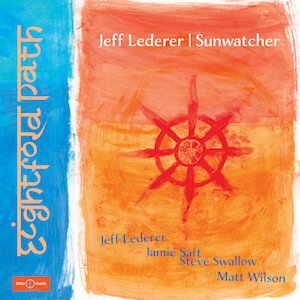Label: Astral Spirits Records, 2021
Personnel - Mike Reed: drums; Tomeka Reid: cello; Nicole Mitchell: flute, electronics.
Artifacts is a trio of front-rank modernists and respected bandleaders - drummer Mike Reed, flutist Nicole Mitchell and cellist Tomeka Reid - who dive deeper into groove on their sophomore album, …And Then There’s This. As members of the prestigious Chicago institution AACM (Association for the Advancement of Creative Musicians), the threesome carries its legacy forward and pay tribute to a few of its influential figures, living and departed. In contrast to their self-titled debut (482 Music, 2015), this strengthened followup includes originals by all members of the trio.
Reed’s elated “Pleasure Palace” evokes the Afro sounds of the Art Ensemble of Chicago by means of a grooving pulsation, furtive cello attacks and fluttering flute deliberations. Two founders of the cited avant-garde jazz group are referred in different ways. Penned by the saxophonist Roscoe Mitchell, “No Side Effects” is put forward with a mix of hip-hop and reggae influences, having the raspy cello interacting with the ever-dancing flute. Mitchell and Reid are also busy during the collectively built “Song for Joseph Jarman”, likely the most abstract and ponderous piece on the record.
Another spontaneous trio effort, “Dedicated to Alvin Fielder”, eulogizes the late drummer with Eastern-flavored chromaticism, flutter-tonguing flute, slow-motion groove and tickling percussion. Mitchell, who explores the upper and lower registers of her instrument with both stability and abandon, also employs cute electronic effects on Reid’s “In Response To”, which swings and rocks with unfailing energy. Also composed by the cellist, “Song For Helena” dawns with solemnity before embracing a waltzing delicacy where the melody is crucial.
“Soprano Song”, composed by the AACM co-founder and pianist Muhal Richard Abrams (he first recorded it in 1987 on the album Colors In Thirty-Third) gets a bracing interpretation here, where an elastic backdrop is guaranteed through apt rhythmic mutations provided by cello and drums. Its contrasting tones and textures immediately hit you.
The combination of primitive energy and charming up-to-date aesthetics sweeps the whole album, and Mitchell’s “Blessed” is not an exception, bringing a straight 4/4 backbeat into a pop/rock-inspired scenario that also contemplates a fine cello solo.
Patching together elements that fully cohere, the Artifacts trio experiences synergistic forces guiding their instrumental proficiency.
B+
Favorite Tracks:
01 - Pleasure Palace ► 04 - In Response To ► 07 - Soprano Song








































